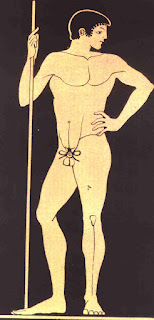I was once a member of a very liberal, “inclusive” Episcopalian church, whose congregation was zealous in extending “Christ’s love” to everyone, everywhere and in denouncing “Christian nationalism” as bigotry. But in recent years, I have grown quite skeptical of “religious” people (even liberal Episcopalians) who, out of a sense of fairness—or perhaps just indifference—glibly espouse “freedom of religion,” as a basic tenet of their “Christian” faith. They understand and accept, of course, that American law legitimately gives everyone the right to practice any or no religion—it’s up to the individual, not the state, to decide. But I think their faithful allegiance to the Constitution may reveal a pretty unfaithful (and perhaps counterfeit) commitment to basic Christian doctrine.
Because the notion of freedom of religion does not accord very well with Christian claims of exclusivity and salvation through Jesus. Consequently, there is considerable cognitive dissonance involved when an individual opts to “believe” in one transcendent, extra-legal path to truth, while simultaneously affirming that other religions (or no religion at all) might ALSO be the “best way” and therefore have an equal claim to ultimate truth. In other words, it seems to me that an allegiance to “freedom of religion”—when adopted by a self-proclaimed “religious” person—amounts to little more than a disingenuous paraphrase of Orwell’s formula: “all animals are equal but some are more equal than others”. Aren’t these “Christians against Christian nationalism” actually asserting (with maybe a virtuous wink?) that all religions are equally worthy, but ours is really more worthy?

If so, that’s Orwellian newspeak, i.e., delusional, complacent hypocrisy, well-meant, perhaps, but fundamentally insincere—language intended to reduce the possibility of actual understanding. Bad faith, both literally and philosophically.
But, as someone is sure to object, what if this belief in the collegiality of all belief systems is a genuine intellectual and emotional stance, held with no reservations whatsoever? Well, then, it seems to me that the liberal “Christian” needs to recognize the utter shallowness (indeed, fatuity) of his Christianity. After all, if one religion (say Christianity) IS really no better than any other religion (or no religion), then what, for goodness’ sake, is the point of clinging to that particular religion (except, maybe, for the comfort of familiar rituals and communal potlucks)? Why not just commit ourselves to the human race (a cause we can all—more or less—agree on) and resolve to devote our lives to being decent human beings?

So, then, does freedom of religion remain a “good thing”? Well, as a legal matter, yes, of course. Absolutely. In the U.S., the land of the free and the home of con-men and pyramid schemes, the Constitution guarantees that all citizens have the right to choose any religious affiliation they like. My only quibble here is that the very act of making such a choice—among a bunch of equally fantastical and equally unprovable creeds—seems pointless and absurd. Why not just choose freedom FROM religion?

I’ll end my rant by revisiting the tired but occasionally useful metaphor of a baby in bathwater. Personally, I am convinced that ALL religions, including both Christian nationalism and liberal Episcopalianism, amount to little more than fantastical bathwater, grown opaque over the centuries, but with absolutely NO BABY soaking within. Though these waters are indeed murky, I remain confident that anyone exploring them thoroughly will find, as I did, that there’s nothing alive and nothing of value in the tub. Just gray soak-water, grown cold. No. Baby. Nada.
So please, dear liberal Christians—simply acknowledge the futility of searching for a baby in the bilge and, in an act of much-needed housekeeping, toss it ALL out. Once you do so—once you free yourself of ALL notions of Christian exceptionalism—I am confident that you will be much better equipped to combat, "in good faith," the very real threat you have correctly recognized in “Christian nationalism.”













